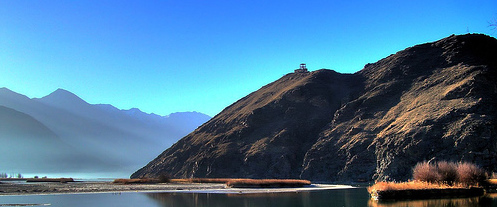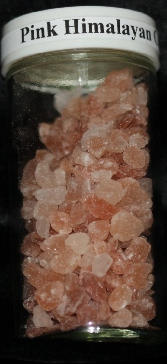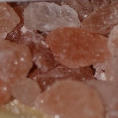Himalayan Crystal Salt
|
Himalayan Crystal Salt |
 |
|
Himalayan Salt
- An Introduction Ancient, beautiful, and
mysterious
|
|

|
Himalayan salt is one of the most valued elements on
Earth.
- Hails from the valleys and rivers which lie deep within
the Himalaya Mountain Range.
- It has
been coveted for centuries due to its beauty,rich
mineral content, and
versatilitY
Himalayan salt is incredibly unique in appearance, texture, history, and usage.
- This
amazing salt carries a vast array of benefits both when used in the bath and when used in
food.
- It
softens the skin, soothes aches and pains, and contains up to 84
minerals that balance and detoxify the body.
Himalayan salt is the one of the purest, most natural salts in the
world.
|
| Himalayan Salt - An Ancient
Wonder |
|
Between 30 and 50 million years old, the Himalaya Mountain Range is
located in Asia and is home to mountains with the highest elevation in the world, including
Mount Everest. The highest peak reaches 26,000 feet.
The colossal mountain range stretches across 1700 miles and 6
countries: Afghanistan, Pakistan, Nepal, India, China, and Bhutan - the largest portions of the
range in Nepal and Bhutan. Within the Himalayas you will find many rivers flowing between the
mountains, including the Ganga, Brahma, and Indus, the largest river in the mountain
range. In addition to rivers, there are many lakes beautiful lakes, mostly the product of
glacial activity.
Within these rivers and lakes that cover the majestic mountain range,
you will find an ancient treasure that people for generations have coveted: Himalayan salt.
Millions of years ago, water within the Himalayan mountain range evaporated under the hot sun
and left pure, beautiful crystals of salt behind. The salt formed when the earth was pristine and free
of toxins, and today, each grain of salt remains untainted and clean.
For centuries, Himalayan salt has been valued for its purity
and its beauty, and has long been a staple within the communities which reside in the
area.Also known as “King
Salt”, salt of the Himalayas has been traded,
bought, and sold as a precious commodity. People from around the world have travelled to
Nepal with one goal in mind: to buy precious Himalayan salt and use it in their cooking and
in their baths and beauty treatments.
|
|
Inside a Grain of Himalayan
Salt
|

|
|
Within each grain of this amazing salt is a self-contained
universe, reflecting the history of the ancient waters within the
world’s most beautiful and mysterious mountain range. Himalayan salt is quite different from salt
found anywhere else.
For one thing, it’s beautiful: it often has a pinkish or light reddish
tint, and under a microscope, the crystals within the salt form gorgeously perfect geometric
patterns. Large shards of salt crystals are often marketed as decorative items and you’ve
probably seen them in the form of table lamps (think large pinkish crystals with light shining
from the center).
Himalayan salt, when left raw and in its natural
state, is rich in nutrients and
minerals. Since many of these elements found within
each grain of salt naturally occur within us and in the environment, they are easily absorbed
and utilized on a cellular level,. This is why Himalayan salt is popular both as a food and as a bath
salt - as salt goes, it is incredibly healthy and
carries a variety of benefits.
Himalayan salt reportedly contains upwards of 84 different minerals, including Iron, Copper, Potassium, Magnesium, and
Calcium. These elements can be absorbed through our skin or orally in the form of table salt and
are all beneficial. Iron aids in the transport of oxygen to our cells and gives our blood its
red color. It also improves the body’s immunity, encourages deep sleep, and boosts our overall
energy level.
-
Copper is a
naturally abundant mineral in our bodies, and has many benefits including the
protection of our cardiovascular, skeletal, and nervous
systems.
-
Magnesium is an
often overlooked mineral and close to 90% of us don’t get enough of it - if you don’t
have enough of it in your diet, you may experience symptoms such as appetite loss, lack
of energy, headaches, and even depression. It keeps the heart healthy, and aids in the
absorption of other vital nutrients.
It’s no wonder Himalayan salt is so
popular. It’s versatile, beautiful, and healthy. So
now that you know a bit more about Himalayan salt - it’s rich history, the makeup of each
crystal - it’s time to learn about how you can use it at home. And this is where it gets
interesting! You can eat it for dinner, and soak in it before bedtime. Talk about versatile,
right? Well, keep reading!
|
|
Mineral Rich
Ormus Salts Combinations
|
|
Do you want to
make your own Ormus Minerals?
|
|
We have searched for salt from around the world and brought together a
combination of salt that will give you some very rich Ormus minerals with the wet method
precipitate.
|
|
Available Now!
|
|
Pink Himalayan Crystal Salt
|
From
|
Pakistan
|
|
Dead Sea Salt
|
From
|
Israel
|
|
Organic Certified Grey Sea Salt
|
From
|
France
|
|
Great Salt Lake Salt
|
From
|
Utah, USA
|
|
Korean Sea Salt
|
From
|
South Korea
|
|
Korean Bay Forshore Salt
|
From
|
SW Coast Korea
|
|
Red Sea Salt
|
From
|
Israel
|
| |
|
Weight
|
Cost
|
Total Cost
|
Shipping Is Extra
|
|
1 lb of Salts
|
$5.99 per lb
|
$5.99
|
|
|
5 lbs of Salts
|
$4.99 per lb
|
$24.95
|
|
|
10 lbs of Salts
|
$3.99 per lb
|
$39.90 |
|
|
.jpg)
|
Ormus
Rich
Pink Himalayan Salt
&
Health
|
|
Himalayan salt is delivered to you raw in its natural, pure form and contains
minerals and nutrients from the Himalayan mountains.
|
|
When the Sole evaporates, it leaves behind the salt, exactly as it was. This
transformability of salt ensures that it doesn’t have to be metabolized in our body. Unlike
starch which is transformed into sugar, protein which is transformed into amino acids, and fat,
transformed into glycerine and acid,, salt remains salt. It is directly available to the cells
in the ionized (electrical or energetic) form as Sole.
All other foods
must be separated into their components in order for the body to make use of them. But salt
always remains in its original form. It even accesses our brain directly.
Our body
does not need to metabolize the crystal salt in order for its energy to enter directly into our
cells. Salt has a very unique property. In contrast to all other crystalline structures, the atomic
structure of salt is not molecular, but electrical.
This is
what makes it so transformable. When we submerge a crystal of Himalayan salt into water, it
dissolves, creating Sole, the liquid materialization of the suns energy. Sole is neither water nor
salt. It is a higher energetic dimension than either the water or the salt alone.
|
|
100% Natural Himalayan
Salts "Yes,
they are Gourmet Food Grade Quality"
|
|
Salt from the Himalayas has long been enjoyed in culinary
dishes; it tastes amazing, and has many trace minerals that other types of salt. It goes by many
different names, including “King’s Salt”, “White Gold”, and “Salt of Life”, all indicative of
its value and high status.
High-quality, gourmet food-grade Himalayan salt is quite popular for
consumption. Cooks use Himalayan
salt in all kinds of dishes:
omelet’s, stir-fry, steak, and much more. In most cooking, fine-grain works best, but larger
crystals are great for baked goods (think giant pretzels) and other dishes where large pieces of
salt are preferred.
Humans aren’t the only ones that love to eat Himalayan salt - Himalayan
salt has long been the preferred source of salt for salt licks among owners of livestock, due to
its taste (even the animals like it best!), hardiness (it doesn’t break down, even in bad
weather), and beauty.
Many believe that this salt could be the answer for those of us who
wish to remain healthy and have a bit of sodium in our diet. Using a bit of Himalayan salt in
your recipes instead of ordinary table salt will bring your dishes to
life!
|
|
But what if salt was
healthy?
|
|
Current research suggests that Himalayan salt just might be
better for you than regular table salt. Before the advent of modern medicine, some say the salt was
often utilized as a home remedy to combat symptoms of various illnesses.
And in addition, gourmet cooks and food lovers prefer it over regular
salt, and swear it tastes better.
Ordinary table salt is usually “cleaned” and goes through a chemical process
that often robs it of many trace minerals and nutrients. Sodium chloride is the product left
over after this harsh treatment - a somewhat unnatural form of salt that our bodies have a
difficult time utilizing and digesting.
|
|

|
Note: Himalayan salt is salt.
If your doctor recommends a low-sodium diet, please
follow his or her advice. Himalayan salt carry the same risks as ordinary table
salt.
|
|